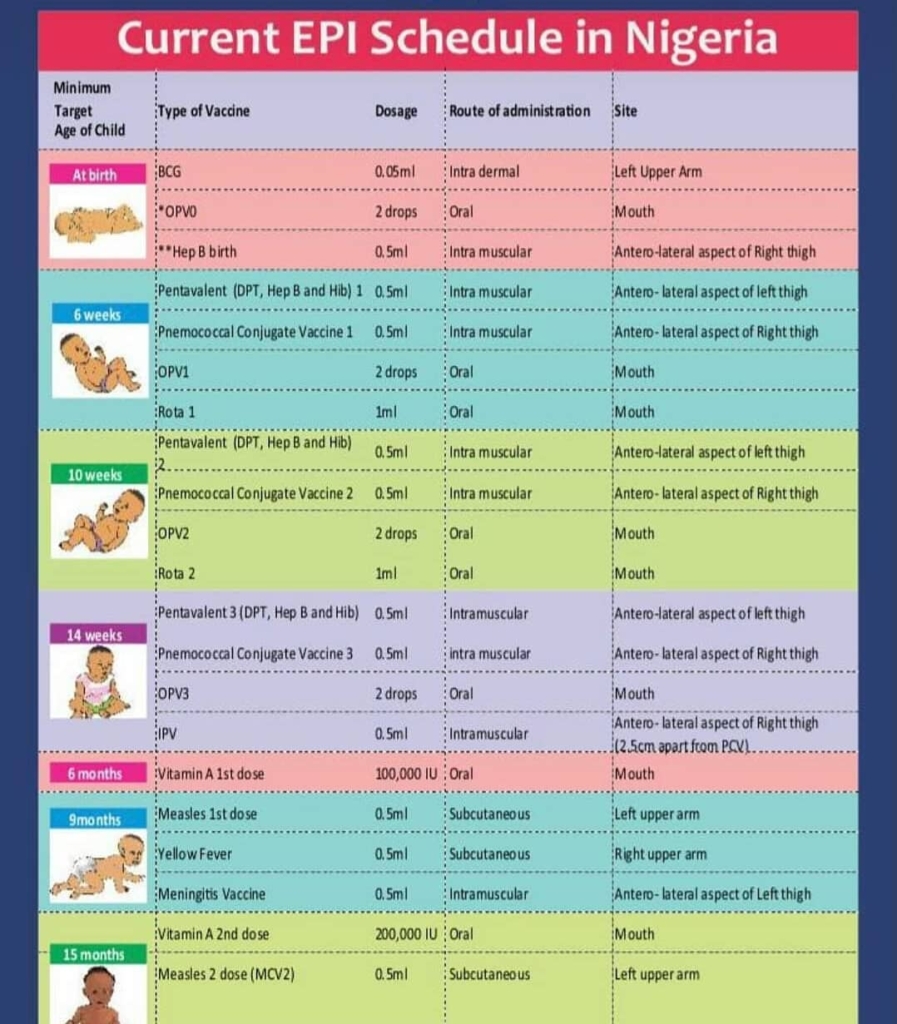
Are you up to date with regard to your child’s immunisation schedule?
Really, you have little or no excuse not to immunise your child because most of the vaccinations are administered for free. This immunisation happens at health centers in Nigeria and in pretty much any major Nigerian health institution and hospitals.
Interestingly, vaccination is one of the most successful and cost-effective ways to protect children’s health. It also protects the future of young children.
Immunisations routinely recommended and provided for infants and children include:
| Type of Vaccine | Benefit to Children | ||
| BCG | Prevents Tuberculosis including bloody cough and permanent brain damage | ||
| OPV0 | Partially protects against poliomyelitis which causes paralysis and death
|
||
| Hep B (birth dose) | Partially protects against hepatitis B which causes blood infection liver disease, cancer, and death
|
||
| Pneumococcal Conjugate Vaccine (PCV) 1 | Partially protects against most causes of pneumonia and meningitis including blood and lung infections and brain damage | ||
| Pentavalent (DPT, Hep B and Hib) 3
|
Partially protects against 5 diseases – Diptheria, whooping cough, tetanus, hepatitis B, and influenza | ||
| Vitamin A Supplement | Protects against night blindness, improves a child’s vision and boost child immunity against infectious diseases | ||
| Measles Vaccine |
|
||
| Yellow Fever Vaccine | Prevents yellow fever |
More so, parent and Health Workers should Note that all Children under five years of age must be immunised against polio. This immunisation must take place during every Immunisation Plus Days (IPDs) and other supplemental immunisation activities.
Vaccines for Children and Adolescents (0 – 18 years)
Since 1997, the CDC has recommended that ALL children and adolescents up to age 18 years should receive the hepatitis B vaccine.
Meanwhile, the World Health Organization recommends all infants receive the first dose of the hepatitis B vaccine within 24 hours of birth (often called the “birth dose”). The are to complete the vaccine series at 2 and 6 months.
However, in order to meet this requirement, the first dose of the hepatitis B vaccine must be the “monovalent vaccine,” which means it is only the hepatitis B vaccine.
Basically, it is very important that babies receive the “monovalent” hepatitis B vaccine at birth (not the “pentavalent vaccine”) in order to protect against a lifelong chronic hepatitis B infection.
Sadly, infants born to moms who are infected with hepatitis B are at extremely high risk of becoming chronically infected after delivery. Meanwhile, receiving the first dose of the hepatitis B vaccine within the first 12-24 hours of life will help save their lives.
Young children are at high risk of developing a lifelong chronic infection if they are exposed to the hepatitis B virus. Currently, one-third of all chronically infected adults were exposed in childhood.
Most importantly, adolescents are included in this recommendation as well because of the potentially experimental lifestyle choices that place them at greater risk of a hepatitis B infection.
There is no second chance to protect a newborn or baby from hepatitis B!
Immunisation Schedule Vaccines for Adults (18 years and older).
Meanwhile, A routine immunisation schedule for adults was first published in 2002. The hepatitis B vaccine is now included in the current list of adult recommendations (> 19 years for the three-dose series and (> 18 years for the Heplisav-B two-dose series).
You may also find our article on Raising Children: 6 Things Mums Should Do Daily helpful
In 2011, the CDC added the recommendation the hepatitis B vaccine be given to all adults with diabetes (type 1 or 2) who are between 19 – 59 years.
Also, clinicians can decide whether or not their diabetic patients 60 years or older should receive the hepatitis B vaccine.
Specifically, this recommendation has also been adopted by the American Diabetes Association.
HepB vaccines are safe; the most frequently reported side effects are a pain at the injection site and low-grade fever.
For additional questions and more insights, click here
Sources: World Health Organisation (WHO), outreachgroup.com.ng




